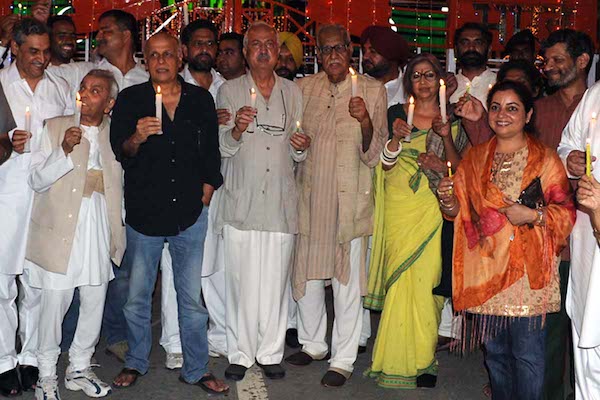
By BRP Bhaskar
Kuldip Nayar was one of the young millions whose life was disrupted by Partition but rebuilt it and went on to make brilliant contributions in his chosen fields, starting with journalism. Devotion to the fine traditions of Punjab‘s composite culture enabled him to overcome the bitterness of the early experience and become a lifelong advocate of India-Pakistan friendship and Hindu-Muslim amity.
Journalism was Nayar’s first love. He had studied law before landing in Delhi as a refugee but started life as a reporter of an Urdu daily. One of the events he covered at that time was Mahatma Gandhi’s assassination.
After spending some years in the government’s public relations outfit, during which period he served as information officer to Home Minister Lal Bahadur Shastri, he returned to active journalism as chief of the fledgling United News of India which big newspapers had launched to provide for competition in agency journalism.
Once out of the government set-up, Kuldip Nayar was keen to follow the path of independent journalism. Since the colonial days, news agencies had limited political reporting to the coverage of briefings and speeches. He broke the self-imposed barrier and pioneered reporting of political developments based on information gathered informally, himself leading the effort.
Morarji Desai believed that his chances of succeeding Jawaharlal Nehru were botched by Kuldip Nayar’s UNI report which said he had “thrown his hat in the ring”. Desai came under heavy criticism as Nehru’s body was lying in state at the time.
Nayar, who was in Tashkent to cover for UNI the Indo-Pakistan summit hosted by Soviet Prime Minister Alexei Kosygin after the 1965 war and reported Shastri’s sudden death at midnight there just in time for the morning editions in India.
After leaving UNI, he began a long innings in English print journalism, first as Resident Editor of The Statesman in Delhi and then as Editor of the Express News Service. He invited Indira Gandhi’s wrath by trying to mobilize public opinion against the Emergency, particularly the restrictions on the media, and was arrested and detained.
After the Emergency there was a shift in gear which took him briefly into diplomacy and into Parliament.
Matthew Arnold famously said journalism is literature in a hurry. To Kuldip Nayar, it was instant history. He took the earliest opportunity to put in book form many of the events to which he was a witness as a journalist. The title of his highly successful first book “Between the Lines” was also the title of a column with which he broke new ground. It was syndicated to a large number of newspapers in India and abroad, giving him a reach none of his contemporaries could claim. Many foreign publications turned to him for insights on Indian and South Asian developments.
Human rights were one of Kuldip Nayar’s primary concerns. He often went beyond the confines of journalism and articulated them as an activist. He regularly led peace activists to the Wagah border to light candles on August 14 and 15 as Pakistan and India celebrated their Independence anniversaries.
A staunch secularist, in the last four years, Kuldip Nayar repeatedly raised his voice against the organized attempts at communal polarization.
Born in Sialkot in 1923. Began his career in journalism in Urdu press.
Nayar was in Tashkent when Lal Bahadur Shastri died. Soon after midnight on January 11, 1966 when most newspapers in India had gone to bed, Nayar phoned in the flash to the United News of India.
High Commissioner of India to the United Kingdom in 1990 and Member of the Rajya Sabha in 1997
Honored with ‘Lifetime Achievement Award’ at the eighth edition of the Ramnath Goenka Excellence awards for his contribution to the field of journalism in 2015
Opposed the Defamation Bill introduced by the Centre in the late 1980s, seen as an attempt to contain free speech in India. It was later withdrawn by the Union government.
Article titled ‘Immigrants or vote banks?’ was published in the Nagpur edition of the Lokmat Times on Thursday morning, hours after his death.
(The author is a Senior journalist and Nayar’s former colleague)





Be the first to comment